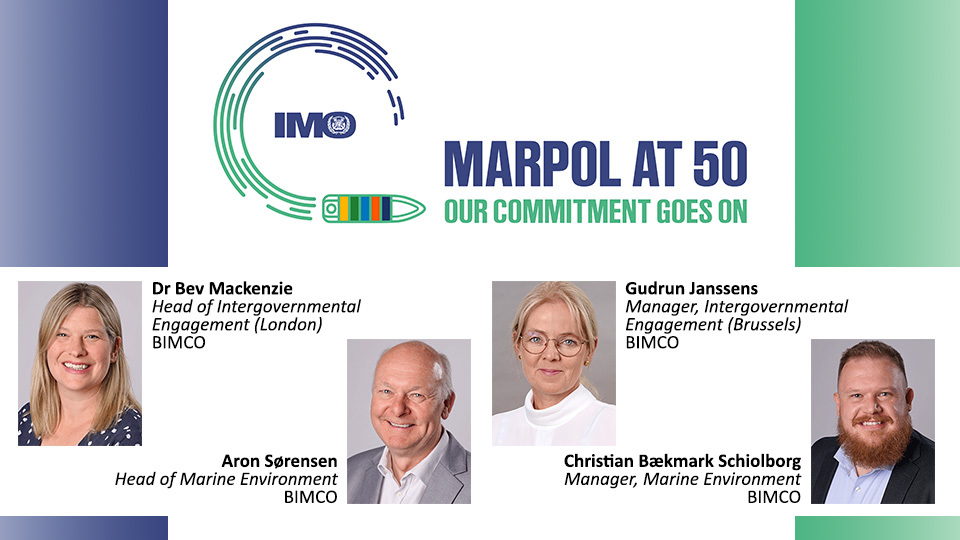
CONTACT BIMCO
Dr. Bev Mackenzie
Head of Intergovernmental Engagement
London, United Kingdom
- +45 4436 6881
- bm@bimco.org

Our commitment goes on – some thoughts from people in the BIMCO Secretariat
Intense public scrutiny of the devastating impact on marine life of plastic pollution is quite a recent development.
For shipping, however, the tale began back in the late 1980s with MARPOL Annex V prohibiting the discharge of garbage and specifically plastics from ships. It has proven to be a powerful tool in the fight to limit the amount of plastics reaching the ocean from sea-based sources- and it’s a really good news story for shipping particularly compared to the amount of plastics reaching the ocean from land. That’s why its my favourite Annex of MARPOL. And it’s truly encouraging to see the dialogue continue on how MARPOL can be used to further protect the ocean from plastic pollution. Perhaps one day we might even be a world where ships do not have any unnecessary single-use plastics onboard at all – which would see shipping as a global leader and change-maker.
Dr Bev Mackenzie, Head of Intergovernmental Engagement (London)
Annex I and V are easily my favourite MARPOL Annexes- because of the tremendous positive impact they have had on the marine environment and on shipping in general. Not only by, for instance, further ensuring the safety of double hull oil tankers, but also by introducing requirements such as oily water separation systems and on how to segregate and deliver different oily waste streams to port reception facilities. This requirement for reception facilities is also covered within Annex V for other waste.
Improvements could be made in the future by ensuring a good ship-shore interface. The way waste is segregated onboard does not always fit with how waste is received in the many different ports around the world. If we want to allow for a world that supports proper recycling (not downcycling), good waste management onboard as well as onshore will be crucial. One area of focus should be the closer cooperation and alignment with other UN bodies with competency for waste management.
Gudrun Janssens, Manager, Intergovernmental Engagement (Brussels)
The introduction of regulation of building oil tankers with double hull and double bottom in the 1990’s has drastically reduced the amount of oil spilled in the event of accidents. Oil spills are really devastating for the environment and this regulation has helped make the transportation of crude oil and oil products much safer.
Aron Sørensen, Head of Marine Environment
It’s MARPOL's Annex VI, Regulation 18 that stands out for me. It requires that authorities ensure that fuel suppliers operating within their jurisdiction sell fuels that comply with MARPOL. Not least that the fuel should not jeopardise the safety of ships or adversely affect the performance of the engine.
Why does it stand out? Because unlike aviation fuel, transparency and traceability of marine fuels are often overlooked by the authorities. Despite the obligation in MARPOL this has resulted in several contamination cases affecting numerous ships.
Looking forward, I'm eager to see authorities enforcing transparency and traceability by introducing licensing for companies in the fuel supply chain. As reported to the IMO’s MEPC, the industry desires this. It's crucial, especially with the arrival of alternative green eFuels – a transition that will further necessitate transparency and traceability in marine fuels’ lifecycle emissions.
Christian Bækmark Schiolborg, Manager, Marine Environment